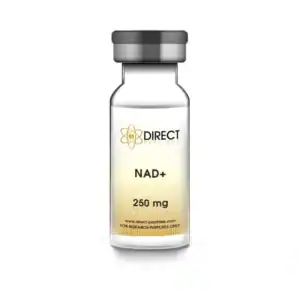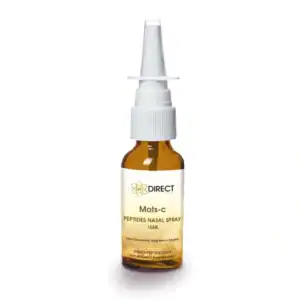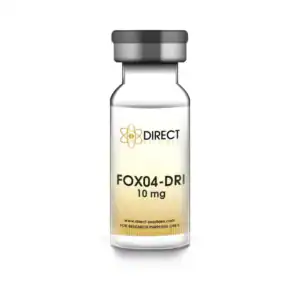Within cellular metabolism lies a simple yet powerful molecule that significantly affects human physiology: Nicotinamide Adenine Dinucleotide (NAD+).
Despite its modest nature, NAD+ is drawing intense scientific interest due to its potential roles in longevity, metabolic processes, and health. Research institutions leading biochemistry studies believe that understanding NAD+ could revolutionize our approach to health and lead to new medical breakthroughs.
NAD+ plays a crucial role in the aging process by supporting cellular energy production and DNA repair mechanisms. As we age, the supply of NAD+ levels declines, impacting mitochondrial function and accelerating aging. Boosting NAD+ levels through supplements or lifestyle changes can potentially slow down the aging process.
NAD+ was first discovered in 1906 by British biochemists Arthur Harden and William John Young. Its significance in cellular processes and the structure of NAD+ was later unraveled by American scientist Morris Friedkin in the 1970s.
This pivotal molecule, essential for metabolic health and cellular metabolism, has since garnered widespread attention in the scientific community. With its critical role in DNA repair, gene expression, and the aging process, NAD+ continues to be a focal point of biomedical research.
NAD+ is an important coenzyme found in all living cells, crucial for managing energy. It is involved in over 500 enzyme reactions, including breaking down carbohydrates, fats, and alcohol.
What makes NAD+ special is its role in redox reactions, helping transfer electrons in key metabolic processes like glycolysis and the citric acid cycle. Simply put, without NAD+, the functions that keep us alive would stop.
You can buy premium grade NAD+ Peptides online from Direct Peptides . Shop today for all your research needs.
To understand why NAD+ is important, we need to look at its role in the cell. NAD+ can take different forms, such as NADP+, a coenzyme vital for building processes like the synthesis of fatty acids and steroids. It is mainly produced through salvage pathways, which recycle nicotinamide, a breakdown product of NAD+, to maintain a full and functional NAD+ pool.
So, why is NAD+ significant? It’s crucial in various processes. NAD+ acts as an electron carrier in metabolic pathways, helping transfer high-energy electrons to other molecules to produce ATP, the energy currency of the cell. It also plays a key role in DNA repair, supporting genomic stability and healthy cell division.
NAD+ plays a vital role in energy creation and cellular regulation at the molecular level. It is crucial for various biological processes, including DNA repair, redox reactions, and metabolic functions. By serving as a coenzyme in key metabolic pathways, NAD+ facilitates the transfer of electrons, ultimately aiding in the production of energy within living cells.
Additionally, NAD+ is essential for maintaining cellular homeostasis, supporting optimal cellular functions, and regulating important physiological responses. Its significance in metabolic health and overall cellular metabolism cannot be overstated.
NAD+ is essential for cellular functions in people of all ages. In younger individuals, it helps repair DNA and maintain balance in cells. As people age, NAD+ levels drop, affecting mitochondrial function and potentially leading to metabolic disorders.
Older adults might benefit from NAD+ supplements to counteract aging effects. Understanding how NAD+ works in different age groups is crucial for maintaining good cellular metabolism and overall health.
NAD+ plays a vital role in cognitive function and metabolic processes within the body. It contributes to DNA repair, gene expression, and mitochondrial function, all essential for brain health and energy metabolism.
Studies have shown that maintaining optimal levels of NAD+ can support cognitive function, improve memory, and boost overall metabolic health. By enhancing cellular metabolism and reducing oxidative stress, NAD+ offers promising benefits for cognitive performance and metabolic well-being.
NAD+ is important for cellular and skin aging. As we age, NAD+ levels drop, affecting DNA repair, mitochondrial function, and skeletal muscle health. This decline impacts cellular metabolism and energy production.
Increasing NAD+ levels could help fight signs of aging, enhance cellular functions, and improve skin health. Understanding NAD+’s role in aging is crucial for exploring its benefits for cells, muscles, and skin.
In addition to NAD+, there are other peptides that have garnered attention in the field of anti-aging research. These peptides, namely MOTS-C, Epithalon, and FOXO4-DRI, have shown promise in their potential to combat age-related decline and promote longevity.
It is important to note that these peptides are currently being researched for their effects and are not intended for direct human use without proper scientific evaluation and regulatory approval.
MOTS-C, short for Mitochondrial ORF of the Twelve Senses-C, is a peptide that has demonstrated its involvement in mitochondrial function and metabolism regulation.
Research suggests that MOTS-C may have the ability to enhance physical performance, improve insulin sensitivity, and protect against age-related diseases. Ongoing studies are exploring its potential applications and mechanisms of action.
Learn more about MOTS-C and its potential benefits on our MOTS-C product page.
Epithalon, sometimes referred to as Epitalon or Epithalone, is a synthetic peptide inspired by the natural compound Epithalamin.
Research suggests it may boost telomerase production, an enzyme key to preserving telomere length. Telomeres act as protective caps on chromosome ends, and maintaining their length is linked to enhanced cellular longevity and possible anti-aging benefits.
Discover the science behind Epithalon on our Epithalon product page.
FOXO4-DRI, a peptide derived from the FOXO4 protein, has attracted attention due to its potential to selectively remove senescent cells, which are cells that have entered a state of irreversible growth arrest.
Senescent cells can accumulate with age and contribute to age-related diseases. Preclinical studies have shown that FOXO4-DRI may hold promise as a targeted therapy to remove senescent cells and potentially improve health and lifespan.
Explore the groundbreaking applications of FOXO4-DRI on our FOXO4-DRI product page.
The decline of NAD+ can be attributed to various factors such as aging, DNA damage, oxidative stress, and metabolic disorders.
Additionally, lifestyle choices, environmental factors, and certain medications can also contribute to the decrease in NAD+ levels within the body. Understanding these causes is crucial in developing strategies to counteract NAD+ decline and promote overall health and well-being.
To naturally boost NAD+ levels, focus on maintaining a balanced diet rich in niacin, a precursor to NAD+. Clinical studies show that regular exercise also significantly increases NAD+ levels.
Getting enough sleep and managing stress are crucial for overall cellular health, which supports optimal NAD+ levels. Additionally, intermittent fasting has been shown to enhance NAD+ production in the body.
Explore Peptide Supplies at Direct Peptides for all your reconstitution requirements.
NAD+ supplements are generally safe, with few side effects, like mild stomach issues. It’s important to talk to a healthcare provider before starting NAD+ therapy, especially if you’re pregnant or have health conditions.
Although promising, more research is needed to fully understand the long-term effects and medication interactions of NAD+ supplements. High doses have not been widely studied, so use caution and monitor your use if you decide to try NAD+ supplements.
Restoring NAD+ shows promising benefits in both preclinical and clinical studies. Research points to its role in DNA repair, mitochondrial function, and insulin sensitivity. Its significance in cellular metabolism and overall metabolic health has sparked interest in human clinical trials.
These studies offer insights into cognitive function, aging, and metabolic disorders, with potential advancements for human health. The findings emphasize NAD+’s crucial role at the molecular and cellular levels.
In recent years, there has been an increase in research on NAD+ due to findings suggesting a decrease in NAD+ levels with age, potentially linked to age-related diseases like premature aging.
Several studies have emphasized its importance in healthspan and maintaining good health, highlighting implications for conditions such as Alzheimer’s disease, Parkinson’s disease, and metabolic syndromes. These encouraging results have led scientists to investigate strategies to boost NAD+, including using precursors like nicotinamide mononucleotide (NMN) and nicotinamide riboside (NR).
Research in neurodegenerative diseases has been particularly productive for NAD+ studies, with exciting possibilities for developing therapies to address neurodegenerative pathologies.
The connection between NAD+ levels and sirtuins—a group of proteins involved in various cellular processes such as aging, energy production, and acetyl group removal during anti-inflammatory responses—further emphasizes NAD+’s vital role in disease processes.
The potential of NAD+ to impact multiple health aspects is remarkable, with evidence indicating improved metabolic health. However, it is not solely about the amount of NAD+; understanding the regulation of its synthesis, usage, and degradation within cells involves complex interactions that scientists are just beginning to explore.
Ethical considerations in NAD+ research involve conducting studies responsibly with human subjects, ensuring informed consent, and protecting participant confidentiality. It’s important to be transparent in reporting results and any conflicts of interest.
Equally important is the careful use of animal models, ensuring humane treatment and minimizing suffering. Following regulatory guidelines, disclosing funding sources, and undergoing rigorous peer reviews maintain the integrity of NAD+ research. Balancing scientific progress with ethical principles is crucial for advancing NAD+ knowledge ethically.
NAD+ plays a key role in cellular health, sparking interest in NAD+ supplements to boost human physiology. Options include precursors like NR and NMN, and delivery systems such as NAD+ peptides. These supplements aim to increase NAD+ levels steadily, potentially countering age-related decline and offering hope for anti-aging and therapeutic benefits.
NAD+ supplements are appealing, with reports and early studies suggesting improvements in energy, cognition, exercise performance, and circadian rhythms. However, NAD+ supplementation is still new, with ongoing discussions about the best dosages, administration methods, and long-term effects.
The excitement surrounding NAD+ is well-deserved. Its role in biochemistry and potential clinical applications suggest it could significantly impact human health. The current challenge is to build a solid scientific foundation to develop safe and effective NAD+ interventions.
Future research on NAD+ will likely reveal more about how we can adjust this molecule to boost health and fight disease. Advances in how NAD+ is administered, and combining it with other targeted treatments, could usher in a new era of personalized medicine, with NAD+ supplementation tailored to individual health needs.
The path forward with NAD+ is filled with both excitement and trepidation. The potential benefits are vast, but much remains to be uncovered about the inner workings of this master molecule and the effects of altering its levels. Laboratories, universities, and research institutions have a crucial role in this unfolding story, where meticulous exploration and robust scientific inquiry will pave the way for a future shaped by our understanding of NAD+ and its place in human health.
So what is NAD+ peptide? It is a peptide of both fascination and immense potential. For researchers, the call to action is clear—to engage with NAD+ research and to participate in the collective effort to decipher the role of this enigmatic molecule in the intricate dance of cellular life and health. Each new discovery brings us closer to unlocking the full extent of NAD+’s powers and to potentially harnessing them for the advancement of human well-being.
Shop ALL Peptide Vials from Direct Peptides today, your trusted supplier of premium clinical grade peptides online.
[1] Bieganowski P, Brenner C. Discoveries of nicotinamide riboside as a nutrient and conserved NRK genes establish a Preiss-Handler independent route to NAD+ in fungi and humans. Cell. 2004 May 14;117(4):495-502.
[2] Imai S, Guarente L. NAD+ and sirtuins in aging and disease. Trends Cell Biol. 2014 Aug;24(8):464-71.
[3] Rajman L, Chwalek K, Sinclair DA. Therapeutic Potential of NAD-Boosting Molecules: The In Vivo Evidence. Cell Metab. 2018 Mar 6;27(3):529-547.
Yes. NAD+ is naturally produced inside cells through several biosynthetic pathways. Cells synthesize NAD+ from vitamin B3 precursors such as nicotinamide, nicotinic acid, and tryptophan. The salvage pathway is the primary route, continuously recycling nicotinamide to maintain intracellular NAD+ levels required for essential metabolic,and regulatory processes.
When NAD+ levels drop, cellular energy production becomes inefficient and DNA repair activity declines. Low NAD+ also reduces mitochondrial function and limits the activity of enzymes involved in metabolic regulation. Over time, NAD+ depletion contributes to cellular stress, impaired metabolic balance and accelerated functional decline at the cellular level.
Yes. NAD+ plays a central role in maintaining cellular redox balance. It supports metabolic reactions that limit excess reactive oxygen species and helps sustain antioxidant systems. Reduced NAD+ availability disrupts redox homeostasis, leading to increased oxidative stress, and higher susceptibility to cellular damage, particularly in mitochondria and energy dependent tissues.
NAD+ regulates gene expression indirectly by serving as a required substrate for enzymes such as sirtuins and PARPs. These enzymes modify proteins involved in chromatin structure and transcriptional control. Changes in NAD availability influence enzyme activity, which in turn alters gene regulation, cellular stress responses and metabolic signaling pathways.
Restoring NAD does not reverse biological aging, but research shows it can improve several age related cellular functions. Increased NAD+ supports mitochondrial efficiency, DNA repair capacity, and metabolic regulation. Current evidence suggests NAD+ restoration may slow or mitigate specific aging processes rather than fully reverse aging at the organism level.

TWIN PACKS
NAD+ Peptide Vial
£41.48 – £149.31Price range: £41.48 through £149.31 Select options This product has multiple variants. The options may be chosen on the product page
Mots-C Nasal Spray
£37.79 – £70.58Price range: £37.79 through £70.58 Select options This product has multiple variants. The options may be chosen on the product page
BULK BUY
FOXO4-DRI Peptide Vial
£197.40 – £671.16Price range: £197.40 through £671.16 Select options This product has multiple variants. The options may be chosen on the product page
Epithalon Pre-Mixed Pen 100mg
£96.33 – £260.09Price range: £96.33 through £260.09 Select options This product has multiple variants. The options may be chosen on the product pageALL CONTENT AND PRODUCT INFORMATION AVAILABLE ON THIS WEBSITE IS FOR EDUCATIONAL PURPOSES ONLY.
DISCLAIMER: These products are intended solely as a research chemical only. This classification allows for their use only for research development and laboratory studies. The information available on our Direct Peptides website: https://direct-peptides.com is provided for educational purposes only. These products are not for human or animal use or consumption in any manner. Handling of these products should be limited to suitably qualified professionals. They are not to be classified as a drug, food, cosmetic, or medicinal product and must not be mislabelled or used as such.